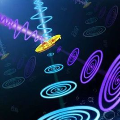While quantum computers have the potential to perform a wide range of practically important tasks beyond the capabilities of classical computers, realizing this potential remains a challenge. One such task is to use an untrusted remote device to generate random bits that can be certified to contain a certain amount of entropy. Certified randomness has many applications but is fundamentally impossible to achieve solely by classical computation. In this work, we demonstrate the generation of certifiably random bits using the 56-qubit Quantinuum H2-1 trapped-ion quantum computer accessed over the internet. Our protocol leverages the classical hardness of recent random circuit sampling demonstrations: a client generates quantum "challenge" circuits using a small randomness seed, sends them to an untrusted quantum server to execute, and verifies the server's results. We analyze the security of our protocol against a restricted class of realistic near-term adversaries. Using classical verification with measured combined sustained performance of $1.1\times10^{18}$ floating-point operations per second across multiple supercomputers, we certify $71,313$ bits of entropy under this restricted adversary and additional assumptions. Our results demonstrate a step towards the practical applicability of today's quantum computers.
翻译:暂无翻译



